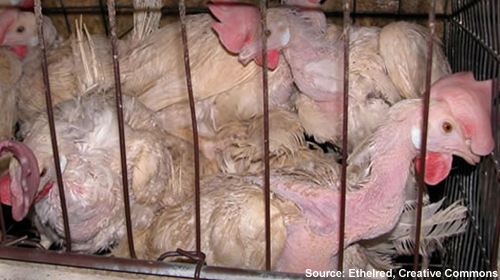
A story out of Utah this week neatly showcased the rising concerns among civil liberties and press freedom groups around so-called "ag-gag" laws, which, in various ways, make it illegal to document animal abuse on factory farms and other agricultural businesses. In Utah, authorities charged a local woman with taking photographs of animal cruelty from a public vantage point, and then quickly dropped the charges after significant public outcry.
Ag-gag laws have long been highly unpopular among the animal rights and food safety movements. But, the Utah case shows the extent to which these laws are flagrant violations of the First Amendment—and how much they have in common with other recent attempts to limit our constitutional right to photograph and record (while in public). While the animal welfare aspects to the problem are central, these constitutional considerations should not receive short shrift.
There are three basic flavors of ag-gag laws, and many states have introduced measures that include more than one. The first type makes it illegal to record an agricultural operation without the consent of its owner or operator. The second makes it a crime to lie on your resume to gain access to an agricultural facility. And the third requires an individual that suspects she has recorded a depiction of animal cruelty to turn the recording over to the cops. This last flavor is particularly insidious, as it has been characterized by supporters as an anti-animal cruelty measure (but actually seeks to make long-term investigations impossible).
Taken together, these measures—which are law in six states, and have been introduced in 11 others—threaten to virtually eliminate undercover investigations into not just animal abuse, but labor practices, food safety, environmental pollution, and numerous other consumer and public welfare concerns. Worse, many ag-gag laws and bills are quite loose in their definition of agricultural operations, meaning they would cover not only factory farms and slaughterhouses, but even supermarkets and restaurants.
Aside from the public policy concerns, ag-gag laws raise major constitutional issues, some of which may not be immediately obvious.
First, both the unauthorized recording and "resume fraud" provisions punish speech without proof of harm. There are very limited categories of speech—think perjury, price-fixing, or threatening to punch someone in the face—that are subject to lesser First Amendment protection because they are inherently harmful. But ag-gag laws cover speech without evidence of harm, making it illegal to record video without consent, or to lie on your resume to get that video, even if you never do anything with it.
Second, and relatedly, the employment "fraud" statutes are particularly bad because they are not actually fraud statutes. Fraud is one of those categories of speech that is not subject to full First Amendment protection, but to prove fraud you have to show injury resulting from a material misrepresentation. Here, not only do the laws not require proof of injury, the injury that could result isn't actually a result of the lie on the resume.
Rather, when you lie on your resume to get a job at a factory farm and take a video of the abuse of downer cows, it's the abuse of downer cows that results in fewer people doing business with that company, not the recording of the abuse. I realize that point isn't particularly intuitive, but it's true. The Supreme Court recently cited a similar rationale in striking down a law making it illegal to lie about having the Medal of Honor without proof of harm.
There's a lot more to say about ag-gag laws, and we'll be saying it. For now, please urge Governor Haslam of Tennessee to veto that state's bill. I've also taken the liberty of listing all of the enacted and pending ag-gag measures around the country below, as well as noting what type they are. "UR" is an unauthorized recording provision, "EF" is employment fraud, and "MR" is mandatory reporting.
Laws in force:
- Kansas (UR)
- Montana (UR)
- North Dakota (UR)
- Utah (UR, EF)
- Iowa (UR, EF)
- Missouri (MR)
Legislation pending (some of these measures have since died, but could be reintroduced):
- Arkansas (UR, EF)
- California (MR)
- Indiana (UR, EF, and enhanced penalties for certain property crimes)
- Nebraska (MR, EF)
- New Hampshire (MR)
- New Mexico (UR, EF)
- North Carolina (EF, MR)
- Pennsylvania (UR, EF)
- Tennessee (MR)
- Vermont (EF)
- Wyoming (UR, EF, MR)
Learn more about "ag-gag" laws and other civil liberty issues: Sign up for breaking news alerts, follow us on Twitter, and like us on Facebook.

